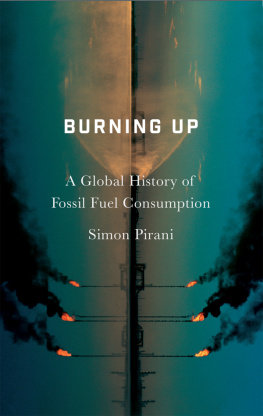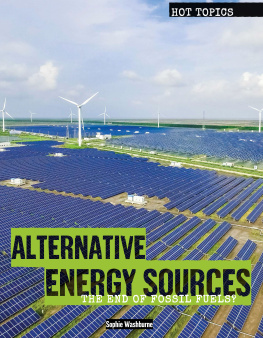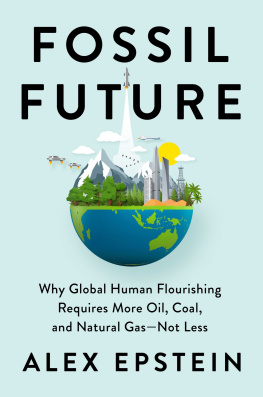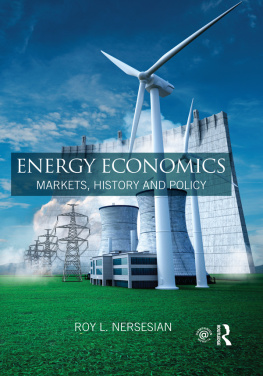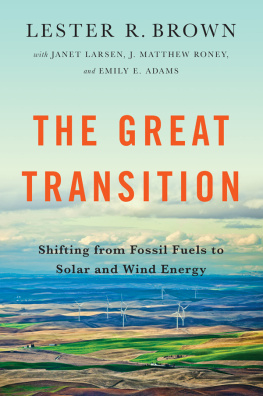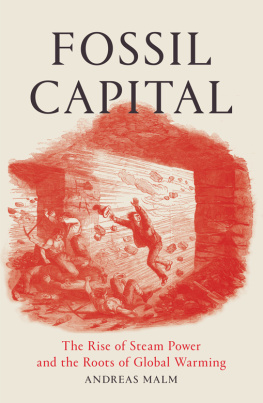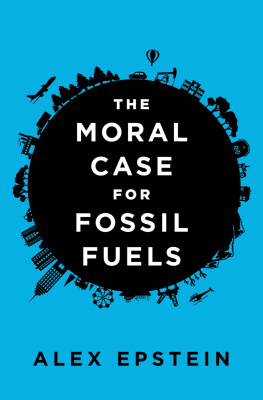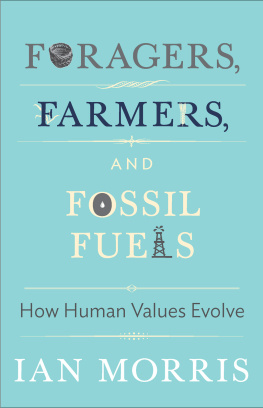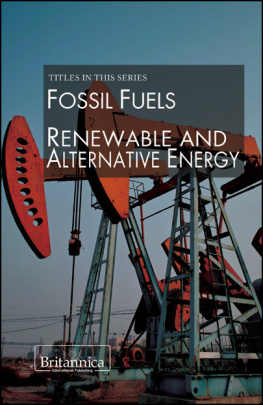
Burning Up
Burning Up
A Global History of
Fossil Fuel Consumption
Simon Pirani

First published 2018 by Pluto Press
345 Archway Road, London N6 5AA
www.plutobooks.com
Copyright Simon Pirani 2018
The right of Simon Pirani to be identified as the author of this work has been asserted by him in accordance with the Copyright, Designs and Patents Act 1988.
British Library Cataloguing in Publication Data
A catalogue record for this book is available from the British Library
ISBN 978 0 7453 3562 9 Hardback
ISBN 978 0 7453 3561 2 Paperback
ISBN 978 1 7868 0312 2 PDF eBook
ISBN 978 1 7868 0314 6 Kindle eBook
ISBN 978 1 7868 0313 9 EPUB eBook
This book is printed on paper suitable for recycling and made from fully managed and sustained forest sources. Logging, pulping and manufacturing processes are expected to conform to the environmental standards of the country of origin.
Typeset by Stanford DTP Services, Northampton, England
Simultaneously printed in the United Kingdom and United States of America
This book is dedicated to the memory of my friend Pavel Sheremet, who was assassinated on 20 July 2016 in Kyiv, Ukraine. The fearless way that Pavel worked, as a journalist in Belarus, Russia and Ukraine, was and is a profound inspiration.
Contents
Figures
Tables
Acknowledgments
Many people have helped me to write this book. I am greatly indebted to Kolya Abramsky, Lucy Baker, Patrick Devine, Doug Koplow, Greg Muttitt and Steve Smith, who read and commented on the manuscript, and to Philip Edwards, for help with the mathematics touched on in Appendix 1. At the Oxford Institute for Energy Studies, my colleagues Bassam Fattouh, James Henderson, Anouk Honore, Malcolm Keay, Howard Rogers, Anupama Sen, and Jonathan Stern have been helpful and supportive. I am particularly grateful to Scott McLachlan, the Institutes librarian, who tracked down elusive books and articles, and to the staff of the British Library, where I did much of the research.
I learned a great deal from presenting at the Sheffield Hallam university history seminar (2014), a Canterbury Christ Church University/UCL seminar (2015), and at the LSE Grantham Research Institute (2017). Presenting at the Historical Materialism conference (2014), the Planetary Natures conference at Binghamton University, USA (2015) and the World Ecology conference at Durham (2016) was also invaluable. I thank, especially, Diana Gildea and Jason Moore for their support at the two latter events. Also, I learned from introducing research material at the Red Green Study Group in London (2015), the Radical Anthropology Group (2015) and the social crisis discussion group (2016), and from conversations with Emma Hughes, Mika Minio-Paluello and James Marriott at Platform London.
Others who have shared their knowledge with me or helped in other ways include Nic Beuret, John Bulaitis, Katya Chertkovskaya, Gareth Dale, Brian Davey, William Dixon, Laura El-Katiri, Don Filtzer, Roger Fouquet, David Goldblatt, Ian Gough, Tim Gould, Amelia Hadfield, Barbara Harriss-White, Nick Hildyard, Jane Hindley, Sohbet Karbuz, David Lamoureux, Larry Lohmann, Brendan Martin, Shonali Pachauri, Walt Patterson, Andrew Pendleton, Thomas Pragacz, Maria Sharmina, Pritam Singh, Lorne Stockman, Dave Temple, Olga Tkach, Steve Thomas and Judith Watson.
Many thanks to Antoine Pesenti, and to the Barry Amiel and Norman Melburn Trust, who made contributions to research costs.
I am also deeply grateful to David Shulman and his colleagues at Pluto Press, and to Hilary Horrocks and Wendy Derose. I have been fortunate to have many friends who have taken an interest in this project: thanks to all of them. More than anyone else, my family Monika first of all, and Nadine, Yusef, Yohan and Kamil has supported me and made what I do worthwhile.
Units of measurement
Energy . The main units of measurement of energy in this book are tonnes of oil equivalent (toe) and kilograms of oil equivalent (koe). When discussing global and national energy balances, millions of tonnes of oil equivalent (mtoe) are usually used. Standard conversions between toe and other units of measurement of energy are shown in .
Table 1 Units of measurement of energy

Source: IEA website
Oil is often measured in barrels. In this book, as elsewhere, international oil prices are referred to in $/barrel. 7.33 barrels of oil equivalent = one tonne of oil equivalent.
When coal was the dominant fuel, i.e. at least until the Second World War, tonnes of coal equivalent (tce) was a common unit of measurement. One tce is usually counted as 0.7 toe. In , I have left measurements given in tce in those units.
Electricity delivers energy. The rate at which energy is generated in the form of electricity is measured in watts (W), kilowatts (kW), megawatts (MW) or gigawatts (GW). The amount of energy generated in the form of electricity is measured as kilowatt-hours (kWh), megawatt-hours (MWh) or gigawatt-hours (GWh). A kilowatt-hour is the amount of energy produced by a 1-kilowatt current in one hour.
The capacities of generating stations and networks are usually measured in MW or GW; the amounts of energy they produce over periods of time in MWh or GWh.
It is common to express large volumes of energy produced as electricity in billion kWh (bn kWh), and I have followed this convention, for example, in . One billion kWh = 1000 GWh = 1 terawatt-hour (TWh).
Vehicle fuel efficiency is usually measured in litres/100 km. In discussion of the regulation of fuel efficiency in the USA, I have used miles per gallon (mpg). 10 mpg = 23.52 litres/100 km; 20 mpg = 11.76 litres/100 km; and 30 mpg = 7.84 litres/100 km.
Acronyms and abbreviations
ABB ABB (Switzerland), a major engineering company
AC alternating current
AES AES Corporation, a major electricity producer
BP formerly British Petroleum, an international oil company
CCGT combined cycle gas turbine
CHP combined heat and power plant
CO carbon dioxide
EAF electric arc furnace
EIA Energy Information Administration (USA)
EPA Environmental Protection Agency (USA)
FAO Food and Agriculture Organisation of the United Nations
GDP gross domestic product
GE General Electric
GM General Motors
GW gigawatts
ICE internal combustion engine
IEA International Energy Agency
IMF International Monetary Fund
IOCs international oil companies
IPCC Intergovernmental Panel on Climate Change
IPPs independent power producers
koe kilograms of oil equivalent
kW and kWh kilowatts and kilowatt-hours
LNG liquefied natural gas
LPG liquefied petroleum gas
mt million tonnes
mtoe million tonnes of oil equivalent
MW and MWh megawatts and megawatt-hours
NEPA National Electric Power Authority (Nigeria)
OECD Organisation for Economic Cooperation and Development
OPEC Organisation of the Petroleum Exporting Countries
PURPA Public Utility Regulatory Policies Act (USA, 1978)
PV photovoltaic cells
SEB State Electricity Board (India)
SUV sport utility vehicle
tce tonnes of coal equivalent
toe tonnes of oil equivalent
UNDP United Nations Development Programme
UNEP United Nations Environment Programme
Next page
